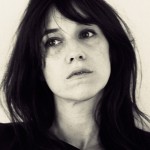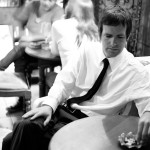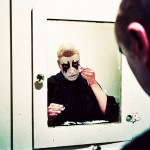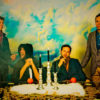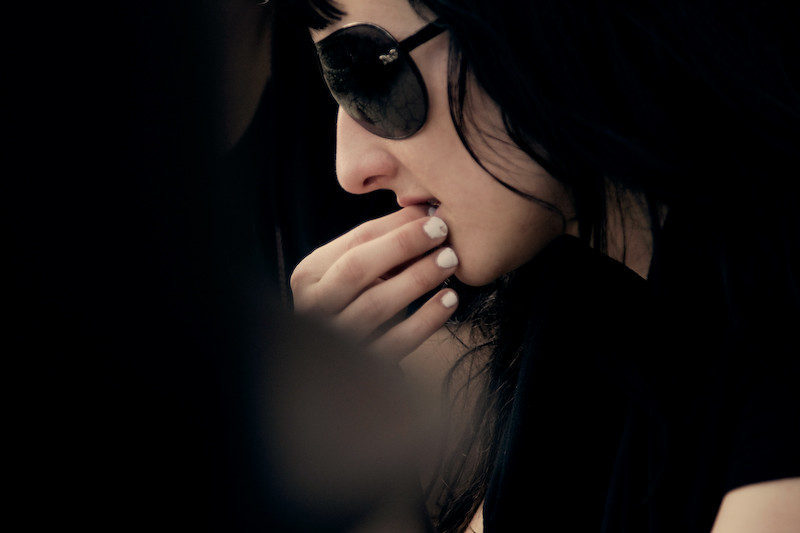
Photos by Aaron Richter
Interview by Andrew Parks
As a general rule, we never interview artists at South By Southwest. While some publications are happy to squeeze a couple pull quotes out of a five-minute conversation, we’d rather save our enthusiasm for a later date–one where we’re not all high, drunk, rushed or some twisted combination of all three.
We made an exception for one artist this year, however: Zola Jesus. And not just because we’re still obsessed with the operatic pop songs on her Stridulum EP and its steel-plated, self-produced counterpart, The Spoils. The 21 year old isn’t able to tour much, as she’s currently wrapping up her French/philosophy degree in Wisconsin, so self-titled figured we’d take what we could get.
What we didn’t expect was the first, and so far only, interview with Nika Roza Danilova and her full live band. While that may seem unnecessary (she’s a solo artist, right?), the group’s innate chemistry could lead to some collaborations on Danilova’s next album, which is expected early next year. And even if it doesn’t, the way the young singer is learning to apply her sky-scraping melodies and subzero soundscapes to an actual band says more about her position as one of today’s most thrilling artists than a simple one-on-one session would. Here’s the supporting cast, then:
ALEX DEGROOT (keys, samples, backup vocals)
NICK TURCO (keyboards, bass)
SHANE VERWEY (synths)
NICK JOHNSON (drums)
You can catch this speaker-caving incarnation of Zola Jesus over the next couple months, including a one-off show at Glasslands in Brooklyn tomorrow night. It’s close to selling out and features a bunch of s/t-approved Sacred Bones artists, so you might want to snag tickets now here. And if you’re not in New York, all other dates can be found on MySpace.
“You can call me whatever you want, but if you do it enough times, I’m going to get irritated”
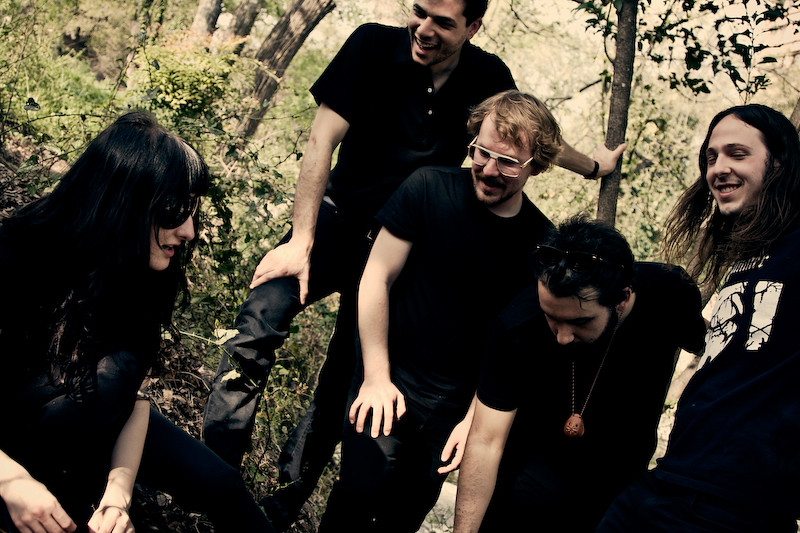
Normally, I hate writers who ask who does what in a band, as it shows a lack of research. But since you guys are new to most of us, are any of you in other projects right now, too?
Alex Degroot: Yeah, I’m in a band called Sonmi with my fiancée. It’s a little more psychedelic, but a similar setup, with a female vocalist. It’s the light side of this [laughs]–a sunnier Zola Jesus, in a way.
Nick Johnson: We’re [points at Shane Verwey] in a similar situation. We play in a doom-metal band called Jex Thoth.
[Looking at Nick’s T-shirt] I see you’re also a fan of Hellhammer…
NJ: Yeah, Shane and I play in a couple of metal bands, actually. Jex Thoth is the main one, but we’re also in a black-metal band called Wormsblood.
That’s your isolationist black-metal project?
NJ: The outsider shit, yeah.
Shane Verwey: It’s a sporadic thing. We have a recording that’s going to come out soon, but we’re pretty much focused on Zola Jesus and Jex Thoth right now.
Are you just saying that because she’s sitting here?
AD: Considering we drove 24 straight hours to get here, I’d say we’re all pretty devoted.
Nika Roza Danilova: [Laughs] I’m still in school, so I couldn’t miss any more time than these couple days.
So how do you all know each other?
NRD: These three guys (Shane and the two Nicks) live together and are my boyfriend’s best friends. And I met Alex at local shows. He’s a really good audio engineer…
AD: I recorded all of the vocals on [Stridulum], so it was a smooth transition from there in terms of doing live stuff.
The production on it sounds great. Was it just you working on the recording then?
AD: She recorded the instruments in demo form, and then we got together to do the vocals and clean up the demos a little bit.
NRD: He helped me make it more presentable.
AD: The songs sounded more structured and poppy than The Spoils from the beginning, though.
So who first played in this band version of Zola Jesus?
NRD: Me, Nick Turco and Shane played a couple shows in August and September of last year, and then we added the other guys.
The Spoils is very much a bedroom recording, so what were some of the differences between your early solo shows and when you brought them on board?
NRD: Playing solo shows was tough. I rarely did them, and if I did, they were usually with my ex-boyfriend Dead Luke. He’s also on Sacred Bones. Anyway, things got weird with him, and we broke up…I played some solo shows with just a Casio in New York, but my live situation was never ideal until I found this supergroup.
Supergroup huh? Are you going to record your next album with these guys then?
NRD: I don’t know yet. Because my songs are so production-based, I’m not sure how I’m going to do that. Either way, we’re all going to keep collaborating…
How about you say a couple things about each member then?
NRD: Okay. What I like about Nick Turco is he has a good sense of melody and can pick anything up immediately. We actually have a project together called Nika + Rory. It’s all pop and R&B music. Pitchfork wrote about one of our songs, but it was basically Auto-Tuned Rihanna stuff.
Is this to show people that you’re not that serious?
NT: People think it’s ironic, but we all really like pop music.
Are you planning on properly releasing any of this material then?
NRD: Definitely. Once we get some more songs done, we can start shopping it around. Maybe Virgin or Interscope will be interested…So that’s that. Moving onto Shane, I met him at my boyfriend’s house. He doesn’t work much, but he plays music constantly.
SV: I have a part-time job, but, yeah, I rely on the kindness of strangers a lot.
NRD: Alex, on the other hand, played some shows with me in the past–ones where we each did solo sets. We eventually talked about collaborating and how I wanted to clean up my productions a lot. As far as technical stuff goes, he’s always on top of his game, and was a great addition [to the band].
Speaking of the production, was that an aesthetic choice originally, or a matter of the means you were working with at the time?
NRD: It was a little bit of both. There were times where I couldn’t exactly get the sound I wanted if it was clean, so I used the textures to my advantage. At the same time, I’ve always loved industrial music, so it’s got that grinding, crunchy effect to it, too. The Spoils was definitely my industrial, experimental album.
AD: I feel like a lot of the older stuff got pigeonholed as “lo-fi.” Some of that was a conscious decision, and some of it was not, so it’s nice to see her breaking away from that now…
I definitely prefer the new record because lo-fi music has such a stigma now–this reputation as a way of hiding bad songwriting.
NRD: It definitely helps to actually be a good songwriter.
AD: This is a better outlet for the songs…
NRD: Yeah, I wanted to prove to myself and everyone around me that I’m not a ‘one-trick pony’. There’s a lot of things I want to do as an artist, so this is just a natural progression.
“There’ll be this 20-minute epic jam in the middle of a 40-minute practice that’s like Steely Dan meets Goblin meets Mariah Carey”
Is industrial music something you’re all into? Us writers seem to be turning that into a bit of a trend now, too…
NRD: Yeah, I get that [comparison] a lot; that, and Siouxsie [Sioux]. You can call me whatever you want, but if you do it enough times, I’m going to get irritated enough to break out of it. Maybe that’s not healthy, but I like to challenge what people think.
Right on. Well, you’ve got a couple more guys here to talk about…
NRD: Nick [Johnson] is such a good drummer. At first, we weren’t sure about adding a live drummer because the music has this cold, rigid, harsh feel to it. But when we got him down there, we made it work.
NJ: We just had to mess around until we found the right vibe.
Did you have to change your entire playing style for this?
NJ: Oh yeah. Zola Jesus [songs] are really strict–it’s hard translating a programmed beat into a live set. I definitely try to break out of my mold a little.
NRD: I love how he brings that black-metal feel to a song like “Manifest Destiny” though. It’s so intense.
AD: We’ve tried it even more metal than that, too. It got to be too much…
NRD: It started to sound like Iron Maiden.
AD: It’s easy to look at Nick and say, “That’s a metal dude right there,” but he’s into everything. You never know what’s going to happen when we rehearse, either.
NRD: Things get really eclectic. There’ll be this 20-minute epic jam in the middle of a 40-minute practice that’s like Steely Dan meets Goblin meets Mariah Carey.
Like most people, I don’t know anything about Wisconsin. So what’s the Madison scene like?
NRD: It’s weird, and because it’s a college town, the turnover rate is really high. You might find a group of people who are great, but in about four years, they’re gone.
NJ: There’s a great history of hardcore and powerviolence bands, though. A lot of drone and psychedelic stuff, too.
NRD: I’ve been guilty of this too, but a lot of bands will just say, “Oh, we have a show coming up, let’s just wing it.”
AD: We have Julian Lynch right now, but he’s only there temporarily because he’s going to school.
NJ: Jex Thoth is weird because our vocalist lives in California. We can only get together once in a while because of that.
Do you have anything new on the way?
NJ: We have an EP (Witness, out now on I Hate Records) with three new songs on it. Me and Shane are very happy with it. It’s pretty somber, but heavy and crushing at the same time. There’s a New Wave of British Heavy Metal influence slipping into it, too. We’re pretty lucky to be doing it.
“If I was going to be a singer, I figured I’d be the real deal”
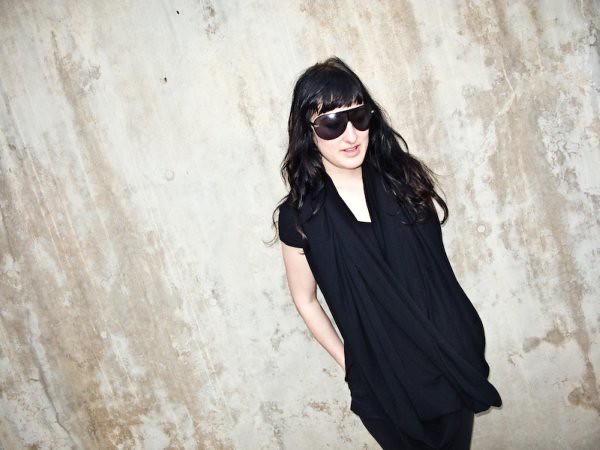
I know she’s standing right here, but why did all of you decide to work with Nika?
NT: She’s an incredible vocalist, obviously. People are ultimately there to see Nika. We’re just there to set the scene and give her the energy to bring the house down. [Laughs]
Well, from an engineer’s standpoint, what do you think is special about Nika?
AD: I was actually worried she was gonna break my microphone when we were recording. She’s easily the most powerful vocalist I’ve ever worked with.
Did you have to get some special equipment for this then?
AD: I used a pop filter, a barrier that goes between a vocalist and the microphone…What I really liked about Nika at first, though, was how we connected over R&B music.
What do you love about R&B so much?
NRD: The content isn’t always the best, but the melodies are just so strange and experimental.
Was anything strange sampled on your EP?
NRD: Yeah, the song “Stridulum” uses a sample from that movie in the chorus.
What’s that movie about?
NRD: It’s hard to explain. A lot of people trashed it for being too abstract.
SV: It’s an accidental art film.
AD: Well, this telekinetic girl makes a bunch of doves fly into this one room and this choral music comes in….
NRD: I get a lot of inspiration from films, especially the scores and moods. So when that part came on, I had to get an audio rip of it.
AD: That’s one thing that was fun about this project–all of the sounds that she gave me were pretty raw and ready to sculpt.
Did you have a bank of samples to work with?
NRD: No, I just keep playing with sounds…
AD: A lot of it comes from this one Yamaha keyboard. Live, we break up all of the samples and play them.
NJ: Working with Nika isn’t stifling. It’s an inviting environment, and she’s always up for something new.
NT: There isn’t a lot of friction in the band. She also lets us do our own crazy things during the songs–some of which end up staying in them.
SV: Being able to improvise in the moment is crucial.
Did any of you play on the new record?
AD: I didn’t want to tell her at first, but I sneaked some synths on there. They aren’t obvious…
NRD: But they add so much!
AD: I actually didn’t admit any of this until our drive up here.
NRD: I’d like to collaborate more in the future. It’s just a control thing.
At least you’re willing to admit that. With that in mind, I have some one-on-one questions [the rest of the band says their goodbyes and walks away]. So the first thing everyone notices about you is the power of your voice. When did you start taking lessons?
NRD: I’ve always loved singing, and when I was 10 years old, I started singing opera. There were these advertisements for singing tapes that you send away for, and when my mother realized I was [ordering] them, she was like, “That’s a scam! That’s a waste of money!” So she enrolled me in opera lessons and from there, I took them off and on for 10 years. I had a lot of anxiety though…
What sort of anxiety? Not feeling confident as a performer?
I was constantly picking things apart–just doubting everything. What I was hearing is not what I thought I sounded like.
Kinda like when you hear your voice on an answering machine for the first time and can’t believe how awful it sounds?
Exactly.
So you started at 10 or 11?
Yeah, maybe even a little earlier.
Why opera? That seems a little heavy for a 10 year old.
It was the only thing I knew. If I was going to be a singer, I figured I’d be the real deal. The opera is so formidable and powerful like that.
Did you actually go to the opera when you were younger?
I went to a few. I don’t know what it was…
The idea of being an opera singer appealed to you more than actual operas then?
Right.
Did you have one influential teacher during this time?
I had one, and it was a constant battle. I respected her, but she knew I had all of these issues, too. I actually just started seeing her again, and she said, “You know what? Everything I taught you when you were a child…you need to forget it.” And I thought to myself, ‘Why are you telling me this now!’ She gave me some experimental techniques, though.
So that you’re not a standard opera singer?
Yeah. Like she isn’t focusing on things like posture. She says the singing comes from a different place than that.
Did you perform a lot throughout high school?
I did a lot of recitals and that sort of stuff. I had this physiological response to stress where I’d lose my voice before performing…
[Our associate editor, Aaron, starts talking] Amy Winehouse has the same problem. I interviewed her during her first press tour, and she would freeze up, put her head between her legs, and just keep saying, “I’m so sorry, I’m so sorry.”
That poor girl. She’s so incredible, and now she’s pretty much gone…
Let that be a lesson to not take up a drug habit.
Oh, don’t worry. I’m not going to be one of those people that drops the ball. I’m very serious about this.
Did you have some breakthrough performances as a kid, where you stopped freezing up?
Not until recently.
“There’s vomit everywhere here. It’s kinda like the apocalypse.”
You must have had some rough solo performances.
Oh, yeah. Always. The first two years of my [Zola Jesus] shows were rough.
Was one really bad?
Sure, there was this one in Lafayette, Indiana, when I still played with my ex-boyfriend. He was upfront doing guitar solos and I was in the back, where you couldn’t hear me. It was really confusing.
Guitar solos?
Well, we used to cover “Baby’s On Fire” by Brian Eno. Not after that performance, though.
What are you covering these days then?
I covered [Justin Bieber’s] “Somebody To Love.” [Laughs]
Do you have a lot of the next record in mind already?
Some of it. I start with the sounds first, not the songwriting, so it can take a while. I have summer school coming up right now. That way I can keep touring, move to L.A., and start working on the record.
L.A. huh?
My boyfriend lives there now, so that’s been in the cards for a while.
You’re done with school in the fall then?
In August, actually.
One last thing: what are some non-musical influences on this record?
I’m really into philosophy and films. Lyrically speaking, I don’t know…
Well you’re not trying to be too obtuse on this record. You write pretty upfront pop stuff.
The thing is, the music’s so theatrical that if I had over-the-top lyrics, it’d be cabaret basically. I’d rather they be like old folk songs–where you say what you need to say flat-out. You know: “It’s not easy to fall in love.” That’s true, isn’t it? I don’t know what else to tell you. I’m from the Midwest, and very straight about everything.
Who are your favorite philosophers?
I really like [Arthur] Schopenhauer a lot. He’s really dark, but only because he’s a bit of a martyr. He believes in suffering–that there’s no point to pleasure in life because man doesn’t deserve it. I believe in that, that you have to work hard and live like an animal. It’s really painful, having all of that anxiety come out.
You seem pretty happy, though.
Oh yeah, I’m happier than I’ve ever been.
Where are you pulling this pain from then?
The world. The world is a very negative place. Just look around. People are indulgent and decadent. They’re never thinking about the long-term. I mean, there’s vomit everywhere here. It’s kinda like the apocalypse.

